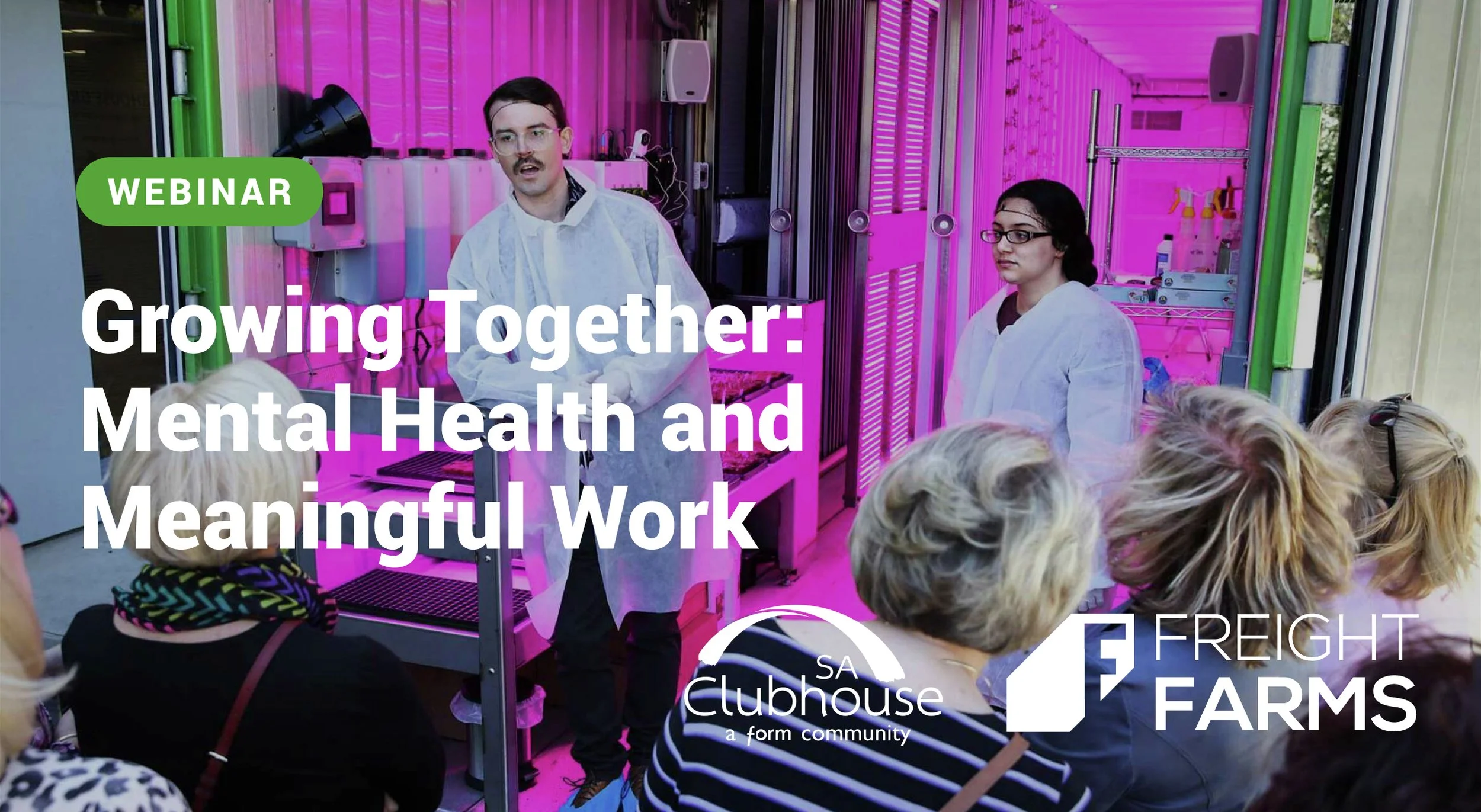San Antonio Clubhouse
San Antonio, Texas | EST. 2019
Model
Nonprofit farming program
Farmers
Clubhouse staff and members
No. of Farms
One
Area Served
San Antonio, Texas
Main Crops
Lettuces, Kale, Radishes, Basil, Mint, Parsley, Borage
Farm Model
Greenery™
Watch our webinar recording with San Antonio Clubhouse!
Farming is an opportunity for members of San Antonio Clubhouse to be empowered and overcome mental health challenges. The Clubhouse is a nonprofit that serves individuals experiencing mental illness through a collection of peer-led support programs; Freight Farming is just one of these valuable opportunities for members to be a part of a community, learn, and grow.
San Antonio Clubhouse Mission
“The Clubhouse is all about togetherness — a belief that together, we will get better. Since 2003, our continuing mission has been to deliver community, opportunity, and hope for those diagnosed with mental illness.”
“Freight Farming is a very unique experience. Everybody that comes through to visit the Clubhouse always wants to see the farm. That’s one of the things they’re most excited about.”
About San Antonio Clubhouse
San Antonio Clubhouse is part of a network of some 300 Clubhouses around the world that work on a local level to serve individuals experiencing mental illness, each approaching the issue from a unique angle. Some Clubhouses have a clinical, medical approach, but San Antonio Clubhouse takes a more holistic approach, focusing on peer support and building a safe community for individuals diagnosed with mental illness, with the Freight Farm as their method of addressing challenges and working toward recovery. San Antonio Clubhouse is unique among Clubhouses in its offering of a container farming program.
Their Freight Farming project started in 2017, when San Antonio Clubhouse received funding for a Freight Farm through a grant from Impact San Antonio. The farm then arrived in 2019, and the Clubhouse has operated it since (only taking a very brief break from programming when the pandemic hit in 2020). Now, the project is sustained through a combination of earned revenue and private donations. Members and staff together run the Greenery farm year-round, with help from farmhand®, the software that automates the farm. “The software is really useful in maintaining the farm,” says Josefina Hajek-Herrera, the Head of Community Outreach with San Antonio Clubhouse’s farming program. “I can’t imagine that we could operate it without it having an automated system.”
“A common obstacle in the Clubhouse model is creating new opportunities that are meaningful and exciting and achievable with an almost exclusively volunteer workforce. That’s why we implemented the farm. We saw it as a great opportunity where it could be led mostly by volunteers and run on its own.”
Community
For members, activities such as farming at the Clubhouse offer an important sense of community. Mental illness can be an isolating experience; Freight Farming gives people a chance to volunteer side-by-side and develop relationships as they work toward recovery. Since mental illness is a shared experience among Clubhouse members, this hands-on work gives individuals who are struggling a chance to gain support from peers who have faced similar challenges, fostering a sense of belonging and usefulness. The Freight Farm isn’t just a farm — it’s a therapeutic farm for mental health.
“I think the possibilities of what this farm process and programming can do for different types of communities and nonprofits is invaluable. If y’all can do it, jump in and do it, because it’s been life-changing for so many people.”
Working in the Farm
Clubhouse staff and members — usually three to four at a time — spend about five hours a day in the farm. Members love going into the farm. It’s nice and quiet, with a peaceful sense of solitude. With the tanks and pumps running, the sound of running water is calming. It’s also not just about the work — it’s more about trying something new, connecting with peers, and gaining confidence.
Members are involved in every step of the farming process: seeding, transplanting, and harvesting — but also packaging, maintaining farm equipment, produce deliveries, managing invoices, preparing meals with the produce, and relationship-building with potential buyers in the community.
San Antonio Clubhouse’s farm is highly experimental. They grow a wide variety of crops, including:
Romaine Lettuce
Butterhead Lettuce
Summer Crisp Lettuce
Dinosaur Kale
Curly Kale
Radishes
Baby Carrots
Beets
Swiss Chard
Basil
Mint
Parsley
Borage
That final crop, borage, is particularly interesting. It’s an uncommonly grown herb with a bright blue flower that tastes like cucumber!
Farm to Community
All the crops that San Antonio Clubhouse members grow go straight to the community — that of the Clubhouse and of wider San Antonio.
Food goes first to the Clubhouse kitchen for member meals, and members can also take home free produce whenever they’d like. About a quarter of the farm’s output goes to three small local restaurants that the Clubhouse partners with — including a juice bar and farm-to-table restaurant. The Clubhouse is open to growing anything restaurants request, which makes them an attractive partner for chefs. In addition, San Antonio Clubhouse has begun piloting a weekly CSA to generate extra income from farm produce. Finally, any extra produce is donated to other charities (like food pantries, churches, and donation centers) around the city whose clients are in need of fresh food.
Their goal isn’t to make money, but rather to provide valuable programming for members. However, they do bring in around $500 monthly on produce sold to restaurants, which helps to cover operating expenses for the farm. But in the end, community is the driving factor in everything the Clubhouse does.
Want to hear more?
We spoke with Josefina Hajek-Herrera, Head of Community Outreach at San Antonio Clubhouse Grows, in honor of Mental Health Awareness Month. Check out the recording of our live interview!
Josefina tells us about San Antonio Clubhouse’s Freight Farming program and how it presents an opportunity for Clubhouse members to feel empowered and overcome challenges.
Recorded: May 18th, 2022, at 11 AM EST








